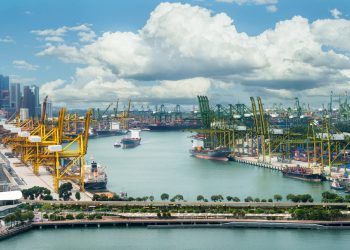The Port of Los Angeles is launching a new incentive program to move trucks faster and more efficiently through its terminals.
The Port’s Truck Turn-Time and Dual-Transaction Incentive Programs offer terminal operators two ways to earn financial rewards: one for shortening the time it takes to process trucks dropping off and/or picking up cargo, and the other for trucks handling both transactions in the same trip.
These best practices are needed now more than ever to relieve pressure on the supply chain due to the ongoing surge. Ports are more fluid when trucks move quickly in and out of the gates and more productive when a truck delivers one container and leaves with another in a single trip. We’re going to reward terminals for better performance
said Port Executive Director Gene Seroka.
Drayage trucks handle about three-quarters of all import and export containers moving through the Port. In recent months, imports have dominated the flow of cargo, draining the market of containers needed for exports. The imbalance has also reduced the number of chassis in circulation, caused inbound containers to stack up on terminals, and slowed the movement of trucks in and out of terminals.
Under the new incentive program approved by the Los Angeles Harbor Commission, terminals that improve truck turn times by 5% to 20% can earn between 50 cents and $2.75 per loaded or empty TEU. The rate of the reward increases on a sliding scale as terminals improve turn times. If a terminal averages turn times of 35 minutes or less in a given month, it will earn the top rate of $3 per loaded or empty container.
Moreover, terminals can earn between 40 cents and $1.40 per loaded TEU when at least half of all trucks calling their facilities drop off one container and depart with another on the same trip. The percentage is based on the number of dual transactions out of all gate moves for the month. Like the turn-time incentive, the rate of the reward increases as the terminal’s percentage of dual transactions grows.
Both incentive programs begin Februay 1 and are based solely on TEUs handled by truck. Incentives will be paid monthly as long as the program remains in effect. For the first year of the program, the Port’s cost is estimated at $7.5 million.
To participate, container terminals must opt in and provide additional details on truck moves. The data will be collected and processed by the Port Optimizer, the tool the Port uses to keep its supply chain partners current on the status of cargo before it arrives, so terminals, trucking companies, railroads and others can plan and allocate resources in advance. No proprietary information is shared.
The Truck Turn-Time and Dual-Transaction Incentive Programs are the latest in a series of Port initiatives aiming to boost cargo efficiency and fluidity. In September, the Port launched The Signal, the Port’s new dashboard for sharing data on inbound containers three weeks before their arrival. In November, the Port added “The Return Signal” to the Port Optimizer site so the trucking community knows when and where to return empty containers throughout the San Pedro Bay complex.





























































